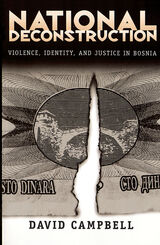3 books about Bosnia

Bosnia
Faking Democracy After Dayton
David Chandler
Pluto Press, 2000
The Dayton Accords brought the Bosnian war to an end in November 1995, establishing a detailed framework for the reconstitution of the Bosnian state and its consolidation through a process of democratisation. In Bosnia David Chandler makes the first in-depth critical analysis of the policies and impact of post-Dayton democratisation. Drawing on interviews with key officials within the OSCE in Bosnia and extensive original research exploring the impact of policies designed to further political pluralism, develop multi-ethnic administrations, protect human rights and support civil society, Chandler reveals that the process has done virtually nothing to develop democracy in this troubled country. Political autonomy and accountability are now further away than at any time since the outbreak of the Bosnian war. The Afterword to this new edition updates Bosnian developments and adds an analysis of the structures and problems of the international protectorate in Kosovo.
[more]

Dubious Mandate
A Memoir of the UN in Bosnia, Summer 1995
Phillip Corwin
Duke University Press, 1999
A critical year in the history of peacekeeping, 1995 saw the dramatic transformation of the role of United Nations’ forces in Bosnia from a protective force to being an active combatant under NATO leadership. Phillip Corwin, the UN’s chief political officer in Sarajevo during the summer of that year, presents an insider’s account of the momentous events that led to that transformation. Dubious Mandate interweaves personal experiences of daily life in a war zone—supply shortages, human suffering, assassination attempts, corruption—with historical facts, as Corwin challenges commonly held views of the war with his own highly informed, discerning, and trenchant political commentary.
Sympathetic to the UN’s achievements, yet skeptical of its acquiescence to the use of military force, Corwin is critical both of the Bosnian government’s tactics for drawing NATO into the conflict and of NATO’s eagerness to make peace by waging war. He challenges the popular depiction of the Bosnian government as that of noble victim, arguing that the leaders of all three sides in the conflict were “gangsters wearing coats and ties.” Highly caustic about Western reportage, he examines the policies of various Western political and military leaders and gives a detailed account of a pivotal phase of the war in Bosnia, a period that culminated with NATO’s massive bombing of Bosnian Serb targets and ultimately led to the Dayton Peace Agreement. Without a proper understanding of this critical period, he argues, it is difficult to understand the greater scope of the conflict. Corwin also offers insightful portraits of some of the leading players in the Bosnian drama, including Yasushi Akashi, the UN’s top official in the former Yugoslavia in 1994–95; General Rupert Smith, the British commander in Sarajevo in 1995; and Hasan Muratovic, a future Bosnian prime minister.
Capturing the essence of a tense and difficult time, Dubious Mandate will interest diplomats, politicians, military personnel, scholars, and those still trying to fathom the continuing mission of the United Nations and the unfolding of events in the former Yugoslavia during the 1990s.
Sympathetic to the UN’s achievements, yet skeptical of its acquiescence to the use of military force, Corwin is critical both of the Bosnian government’s tactics for drawing NATO into the conflict and of NATO’s eagerness to make peace by waging war. He challenges the popular depiction of the Bosnian government as that of noble victim, arguing that the leaders of all three sides in the conflict were “gangsters wearing coats and ties.” Highly caustic about Western reportage, he examines the policies of various Western political and military leaders and gives a detailed account of a pivotal phase of the war in Bosnia, a period that culminated with NATO’s massive bombing of Bosnian Serb targets and ultimately led to the Dayton Peace Agreement. Without a proper understanding of this critical period, he argues, it is difficult to understand the greater scope of the conflict. Corwin also offers insightful portraits of some of the leading players in the Bosnian drama, including Yasushi Akashi, the UN’s top official in the former Yugoslavia in 1994–95; General Rupert Smith, the British commander in Sarajevo in 1995; and Hasan Muratovic, a future Bosnian prime minister.
Capturing the essence of a tense and difficult time, Dubious Mandate will interest diplomats, politicians, military personnel, scholars, and those still trying to fathom the continuing mission of the United Nations and the unfolding of events in the former Yugoslavia during the 1990s.
[more]

National Deconstruction
Violence, Identity, and Justice in Bosnia
David Campbell
University of Minnesota Press, 1998
Book of the Year--Foundation Bosnian-Herzegovinian Book and the Journal Human Rights Review
How did Bosnia, once a polity of intersecting and overlapping identities, come to be understood as an intractable ethnic problem? David Campbell pursues this question--and its implications for the politics of community, democracy, justice, and multiculturalism--through readings of media and academic representations of the conflict in Bosnia. National Deconstruction is a rethinking of the meaning of "ethnic/nationalist" violence and a critique of the impoverished discourse of identity politics that crippled the international response to the Bosnian crisis.
Rather than assuming the preexistence of an entity called Bosnia, Campbell considers the complex array of historical, statistical, cartographic, and other practices through which the definitions of Bosnia have come to be. These practices traverse a continuum of political spaces, from the bodies of individuals and the corporate body of the former Yugoslavia to the international bodies of the world community.
Among the book's many original disclosures, arrived at through a critical reading of international diplomacy, is the shared identity politics of the peacemakers and paramilitaries. Equally significant is Campbell's conclusion that the international response to the Bosnian war was hamstrung by the poverty of Western thought on the politics of heterogeneous communities. Indeed, he contends that Europe and the United States intervened in Bosnia not to save the ideal of multiculturalism abroad but rather to shore up the nationalist imaginary so as to contain the ideal of multiculturalism at home.
By bringing to the fore the concern with ethics, politics, and responsibility contained in more traditional accounts of the Bosnian war, this book is a major statement on the inherently ethical and political assumptions of deconstructive thought-and the reworkings of the politics of community it enables.
"David Campbell has provided not only the first book-length poststructuralist study of the Bosnian war and the international policy toward it, but also the formulation of a deconstructivist ethics of international relations. National Deconstruction is not only a well-argued formulation of a deconstructivist international ethics, it is also a wide-ranging and relentless critique that will leave few unprovoked." --Ethics & International Affairs
David Campbell is professor of international politics at the University of Newcastle, UK, and the author of Writing Security.
[more]
READERS
Browse our collection.
PUBLISHERS
See BiblioVault's publisher services.
STUDENT SERVICES
Files for college accessibility offices.
UChicago Accessibility Resources
home | accessibility | search | about | contact us
BiblioVault ® 2001 - 2024
The University of Chicago Press









